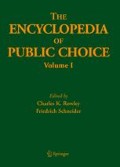Abstract
Education is typically viewed synonymously with formal schooling. Over the past century, state-provided schooling has become the norm for the industrialized world. In the United States, approximately 90 percent of children are educated in schools that are publicly financed and operated (Toma 1996). Similar statistics hold for a significant proportion of developed countries around the world (Toma, 1996). Yet public choice scholars continue to ask normative questions regarding the desirable role of the state that have been asked for at least two hundred years (Senior, 1861; Smith, 1776; Mill, 1909). Specifically, what role should the state play in providing access to schooling and does the consumption of schooling generate externalities that require a state role in provision?
Access this chapter
Tax calculation will be finalised at checkout
Purchases are for personal use only
Preview
Unable to display preview. Download preview PDF.
References
Chubb, John E. and Terry Moe (1990). Politics, Markets, and American Schools. Washington, DC: Brookings Institution.
Epple, Dennis and Richard Romano (1998). “Competition between private and public schools, vouchers, and peer-group effects.” American Economic Review, 88(1): 33–62.
Hoxby, Caroline (2000). “Does competition among public schools benefit students and taxpayers?” American Economic Review, 90(3): 1209–1238.
Mill, J.S. (1909). Principles of Political Economy. London: Longmans.
Nechyba, Tom (1999). “School finance induced migration patterns: the impact of private school vouchers.” Journal of Public Economic Theory, 1(1): 5–50.
Smith, Adam ([1776], 1982). An Inquiry into the Nature and Causes of the Wealth of Nations. Indianapolis: Liberty Fund Press.
Senior, Nassau (1861). Suggestions on Popular Education. London, John Murray.
Toma, E.F. (1996). “Public funding and private schooling across countries.” Journal of Law and Economics, 39(1): 121–148.
West, E.G. ([1965] 1994). Education and the State: A Study in Political Economy, Third Edition. Indianapolis: Liberty Fund Press.
Zimmer, Ron and Toma, E.F. (2000). “Peer effects in private and public schools across countries.” Journal of Policy Analysis and Management, 19(1): 75–92.
Editor information
Editors and Affiliations
Rights and permissions
Copyright information
© 2004 Kluwer Academic Publishers
About this chapter
Cite this chapter
Toma, E.F. (2004). Education and the State. In: Rowley, C.K., Schneider, F. (eds) The Encyclopedia of Public Choice. Springer, Boston, MA. https://doi.org/10.1007/978-0-306-47828-4_83
Download citation
DOI: https://doi.org/10.1007/978-0-306-47828-4_83
Publisher Name: Springer, Boston, MA
Print ISBN: 978-0-7923-8607-0
Online ISBN: 978-0-306-47828-4
eBook Packages: Springer Book Archive

